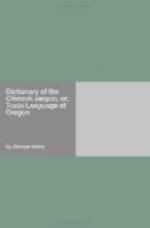The introduction of the Cree and Chippeway words is of course due to the Canadians. None have been derived from the Spanish, as their intercourse with the Nootka and Makah Indians was too short to leave an impression. Spanish words, especially those relating to horses or mules and their equipments, have of late come into general use in Oregon, owing to intercourse with California, but they form no part of the Jargon. It might have been expected from the number of Sandwich Islanders introduced by the Hudson’s Bay company, and long resident in the country, that the Kanaka element would have found its way into the language, but their utterance is so foreign to the Indian ear, that not a word has been adopted.
In the nouns derived from the French, the definite article le, la, has almost in every instance been incorporated into the word, and the same has in one or two instances been prefixed to nouns not of French origin. Besides the words created by direct onomatopoeia, there are quite a number which are really Indian, but have their origin in the similarity of sound to sense.
Dr. Scouler’s analogy between the Nootkan and “Columbian,” or Chinook, was founded on the following words:
English. Tlaoquatch and Nutka. Columbian. plenty, aya, haya. no, wik, wake. water, tchaak, chuck. good, hooleish, closh. bad, peishakeis, peshak. man, tchuckoop, tillicham. woman, tlootsemin, clootchamen. child, tanassis, tanass. now, tlahowieh, clahowiah. come, tchooqua, sacko. slave, mischemas, mischemas. what are you doing akoots-ka-mamook, ekta-mammok. what are you saying au-kaak-wawa, ekta-wawa. let me see, nannanitch, nannanitch. sun, opeth, ootlach. sky, sieya, saya. fruit, chamas, camas. to sell, makok, makok. understand, commatax, commatax.
But of these, none marked with an asterisk belong to the Chinook or any of its dialects. The greater part of them are undoubtedly Nootkan, though there are errors in the spelling and, in some instances, in the meaning. Of the rest, the Nootkan tchaak and the Chinook tl’tsuk alone presents an analogy. Klahowiah does not mean “now,” nor do I believe it is Nootkan, in any sense. It is, as explained in the dictionary, the Chinook salutation, “How do you,” “Good-bye,”




